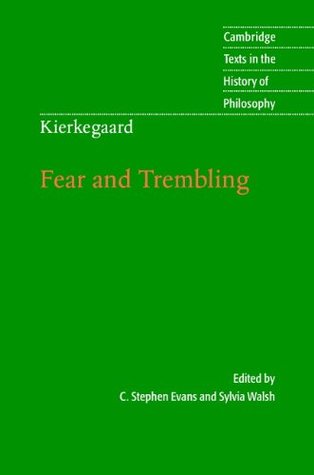More on this book
Community
Kindle Notes & Highlights
Started reading
January 19, 2021
In the world of spirit it is otherwise. Here an eternal divine order prevails, here it does not rain on both the just and the unjust, here the sun does not shine on both good and evil,4 here it holds true that only the one who works gets the bread, only the one who was in anxiety finds rest, only the one who descends into the underworld rescues the beloved,5 only the one who draws the knife gets Isaac.
If that rich young man whom Christ met on his way14 had sold all his possessions and given the money to the poor, we would then praise him as we do everything that is great and would not even understand him without working, but he still would not have become an Abraham even though he sacrificed “the best.” What is left out of Abraham’s story is the anxiety, for to money I have no ethical obligation, but to the son the father has the highest and most sacred duty. Yet anxiety is a dangerous subject for the delicate natured; therefore one forgets it, in spite of the fact that one wants to talk
...more
“I am an orator; what was lacking has been the occasion. When I spoke about Abraham last Sunday, I did not feel moved at all.” If this same speaker had a modest excess of understanding to spare, then I think he would have lost it if the sinner calmly and in a dignified manner had replied: “After all, that was what you yourself preached on last Sunday.”
However, if the sinner was not convinced, then his situation is indeed tragic. He would probably be executed or sent to the madhouse; in short, he would become unhappy in relation to so-called actuality, although in another sense I certainly think that Abraham made him happy, for the one who works does not perish.
The ethical expression for what Abraham did is that he intended to murder Isaac; the religious expression is that he intended to sacrifice Isaac. But in this contradiction lies precisely the anxiety that indeed can make a person sleepless, and yet Abraham is not who he is without this anxiety.
Personally, I do not lack the courage to think a thought whole. So far I have feared none, and should I encounter one like that, then I hope at least to have the honesty to say I am afraid of this thought, it stirs up something strange in me and therefore I will not think it.
Having spoken thus and stirred the audience so they were really sensible of the dialectical struggles of faith and its gigantic passion, then I would not be guilty of an error on the part of the audience should they think: “Well now, he has faith to such a high degree, it is already enough for us just to hold on to his coattails.”
What came easiest for Abraham would have been difficult for me – once again to be joyful with Isaac! – for whoever has made the infinite movement with all the infinity of his soul, of his own accord and on his own responsibility,21 and cannot do more only keeps Isaac with pain.
He believed by virtue of the absurd, for human calculation was out of the question, and it was indeed absurd that God, who demanded it of him, in the next instant would revoke the demand.
The knights of infinite resignation are easy to recognize, their gait is airy, bold. However, those who carry the treasure of faith26 easily deceive because their external appearance has a striking resemblance to that which both infinite resignation and faith deeply disdain – to bourgeois philistinism.
It is now my intention to draw out in the form of problems the dialectical factors implicit in the story of Abraham in order to see what a prodigious paradox faith is – a paradox that is capable of making a murder into a holy act well pleasing to God, a paradox that gives Isaac back again to Abraham, which no thought can lay hold of because faith begins precisely where thinking leaves off.
paradox. They flirt esthetically with the outcome; it comes just as unexpectedly but also just as easily as a prize in the lottery, and when they have heard the outcome they are edified.
Yet greater than all this is that the knight of faith dares to say even to the noble person who wants to weep for him: “Do not weep for me, but weep for yourself.”85
Faith is a miracle, and yet no human being is excluded from it, for that which unites all human life is passion,a and faith is a passion.


